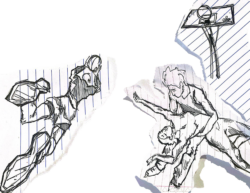Back home at Georgetown, I frequently feel like my interest in sports is gauged by my ability to rattle off statistics rapid fire and intelligently discuss so and so’s trade to the Braves. The sports culture at Georgetown seems to be determined by these standards of facts and figures that fluctuate daily. If you aren’t up on your knowledge to the day, to the minute, then you don’t know sports. Whenever I profess to liking sports or writing for the sports section of the Voice, I’m met with one of two responses. “Oh, that’s cool,” or “Really? What do you think about Teixiera?” Here I tell them the honest truth: I couldn’t care less about baseball.
But does that mean I’m any less of a sports fan? In Jordan, the answer is no. While I’ve only been here for a week, the difference in the sports culture between here and America was immediately apparent. Instead of interrogations from quick-to-judge boys in sweats, I’m met with “Ah, soccer, basketball? We will play.” Whatever complex from being picked on in the elementary school playground that seems to be a fixture of many American sports fans is notably absent here. It isn’t the why/what/who here, it’s the when and the let’s.
On my first day with my family in Jordan, I met my brother. He was off to play kurat al-qadem with his friends and in our awkward introduction I asked where he usually played. This, of course, turned into a five minute “lost in translation” description of a striker, but we eventually converged and got the lingo down. This simple expression of interest on my part led to an invite to “learn” and a challenge on the basketball court. We didn’t delve into favorite teams, players, formations, or the Jordanian medal count (possibly a sore subject), but instead cut straight to the chase. Let’s play.
This Jordanian philosophy behind sports has a bunch of positives. My host brother recently moved from the club level to the school level so he could play in a larger capacity. While he remains competitive, he (and his peers) still have the ability to choose how intense they want their sports involvement to be. At Jordanian schools, students play in age groups; there are teams for each year, resulting in a larger population of athletes. While these teams are still selective, the culture created by this system allows for students to develop a sense of comfort in the sport, and limit the stress of “star athletes” and unrealistic statistics.
Because this concept of “sports for all” is reinforced throughout formative years, it creates lifelong athletes. This has health benefits as well as lifestyle benefits. While the U.S. has a population that is 33.9 percent obese, only 19.5 percent of Jordanians are obese according to the World Health Organization.
Not all hope is lost in America though. To implement our standards of healthy living and to create a more deeply bonded society, we need to change the sports culture in America. This starts at the K-12 level, where Varsity and Junior Varsity can’t be the only options. It’s these patterns that foster the culture of memorizing lines of stats, rather than playing the game.
Moreover, we need to stress the fun of playing and lose the “all-or-nothing” demeanor of our testosterone- (and maybe women’s gymnastics-) fueled culture. While that attitude is sometimes inevitable in professional and university-level sports, the general sports culture does not have to mirror that. We, the average Joe’s who like football or hockey or even dodgeball, can find the value in losing. And we should. Maybe that comes from Yates making intramural sports more accessible, or from Outdoor Ed getting some more attention. Or maybe it comes from a change in the national pastime from baseball to just “play.”




